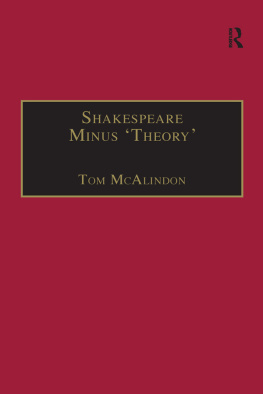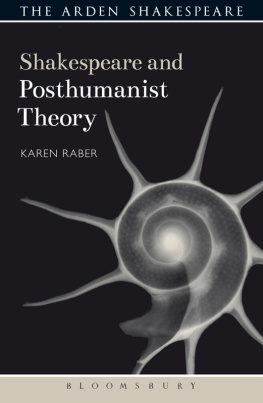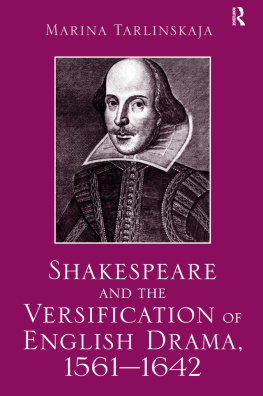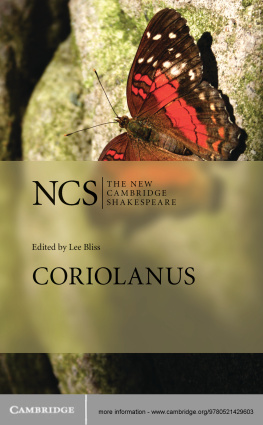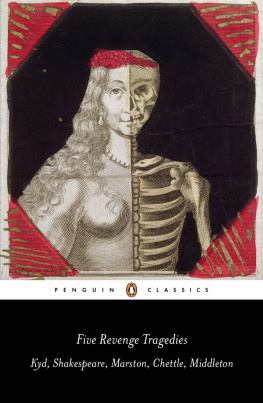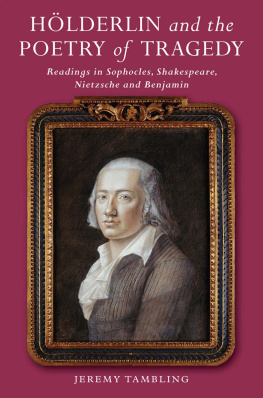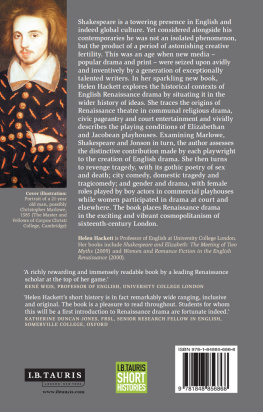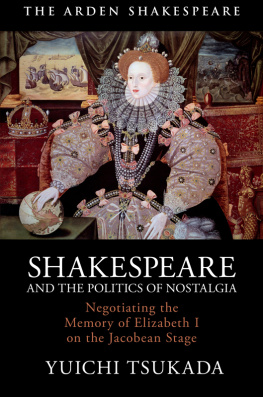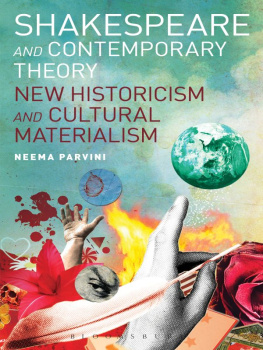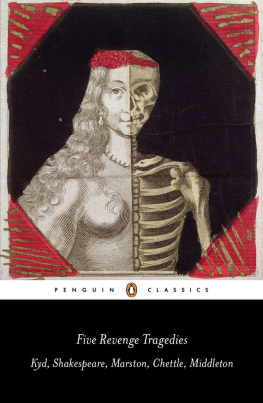SHAKESPEARE MINUS THEORY
Shakespeare Minus Theory
TOM McALINDON

First published 2004 by Ashgate Publishing
Published 2016 by Routledge
2 Park Square, Milton Park, Abingdon, Oxon OX14 4RN
711 Third Avenue, New York, NY 10017, USA
Routledge is an imprint of the Taylor & Francis Group, an informa business
Copyright Tom McAlindon, 2004
The author has asserted his11/24/2016 12:08PM moral right under the Copyright, Designs and Patents Act, 1988, to be identified as the author of this work.
All rights reserved. No part of this book may be reprinted or reproduced or utilised in any form or by any electronic, mechanical, or other means, now known or hereafter invented, including photocopying and recording, or in any information storage or retrieval system, without permission in writing from the publishers.
Notice:
Product or corporate names may be trademarks or registered trademarks, and are used only for identification and explanation without intent to infringe.
British Library Cataloguing in Publication Data
McAlindon, T. (Thomas), 1932
Shakespeare minus theory
1. Shakespeare, William, 15641616 Criticism and
interpretation 2. English drama Early modern and
Elizabethan, 15001600 History and criticism
I. Title
822.33
Library of Congress Cataloging-in-Publication Data
McAlindon, T. (Thomas)
Shakespeare minus theory / Tom McAlindon.
p. cm.
Includes bibliographical references.
1. Shakespeare, William, 15641616 Criticism and interpretation. I. Title.
PR2976.M286 2004
822.33dc22
200365068
ISBN 13: 978-0-7546-3981-7 (hbk)
Contents
This collection of essays seeks to defend and demonstrate a method of close reading and historical contextualisation of Shakespeare and his contemporaries that it has been customary of late to describe (most often derisively) as traditional and liberal humanist, and which, although still widely practised, seldom advertises itself as such. There is, however, a strongly oppositional thrust in the collection. Three of the nine essays are critiques of the claims and methods of radical, postmodernist criticism (new historicism and cultural materialism especially); they illustrate my conviction that some leading scholars in the field of Renaissance literature and drama, who deserve credit for shifting attention to new areas of interest, must also be charged with responsibility for a marked decline in standards of analysis, interpretation, and argument. I am not the first to protest against this development, but our numbers are few. Liberal tolerance in relation to oppositional views, respect for innovation, misplaced regard for the political idealism of radical theory and practice, and professional prudence have too often combined to allow parodies of rigorous scholarship to pass as the real thing.
The remaining six essays are interpretive studies, all but one of which involve challenges to radical readings of the plays involved. The chapter on Henry V is much the longest, its length being due to the fact that I am here challenging a traditional as well as radical views of the play. The concluding chapter, on Marlowes Doctor Faustus, is included because it gives some idea of the thoroughness with which major non-Shakespearean texts have been forced to fit the radical template; because it focuses on theatricality, a subject of almost obsessive concern with many new historicists; and because it highlights Marlowes (serendipitously) ironic perspective on a famous scholars fatally selective reading of a key text.
For permission to reprint, I am grateful to the editors of the following journals, in which .
I would especially like to thank Rowland Wymer, Robin Headlam-Wells, James Booth, Angela Leighton, and John Roe, whose comments on one or more of these chapters have proved most helpful.
Shakespeares Plays and Poems
AWW Alls Well that Ends Well
Ant. Antony and Cleopatra
Cor. Coriolanus
Cymb. Cymbeline
Err. The Comedy of Errors
Ham. Hamlet
1H4 Henry IV, Part 1
2H4 Henry IV, Part 2
H5 Henry V
1H6 Henry VI, Part 1
2H6 Henry VI, Part 2
3H6 Henry VI, Part 3
JC Julius Caesar
Lr. King Lear
Luc. The Rape of Lucrece
Mac. Macbeth
MM Measure for Measure
MND A Midsummer Nights Dream
MWW The Merry Wives of Windsor
Oth. Othello
Per. Pericles
Q Quarto edition
R2 Richard II
R3 Richard III
Rom. Romeo and Juliet
Son. Sonnets
Tim. Timon of Athens
Tit. Titus Andronicus
Tmp. The Tempest
WT The Winters Tale
Periodicals and Series
CQ Critical Quarterly
EETS Early English Texts Society
EHR English Historical Review
EIC Essays in Criticism
ELH English Literary History
ELR English Literary Renaissance
ES English Studies
MLR Modern Language Review
OED Oxford English Dictionary
PMLA Publications of the Modern Language Association of America
RES Review of English Studies
SEL Studies in English Literature
SQ Shakespeare Quarterly
ShS Shakespeare Survey
ShakS Shakespeare Studies
SP Studies in Philology
STC Short Title Catalogue
Chapter 1
Taking Stock: Radical Criticism of Shakespeare
It is now time to take stock of these advances these major steps forward [beyond] traditional modes of Shakespeare criticism and scholarship.
1
Fundamental to the essays in this book are the following intentions: to concentrate on what I judge to be the plays intended meanings; to take due account of the entire text in the process of interpretation; to attend where profitable to aspects of historical context other than the political; to enhance appreciation of the dramatists conscious art; and to encourage readers to empathise with his perspectives on character, action, and life. Clearly, then, these essays will not have contributed to the great march forward celebrated by John Drakakis as he surveys the years between Alternative Shakespeares (1985) and Alternative Shakespeares, Volume 2 (1997), landmark collections of critical essays which typify the radical or postmodernist criticism (deconstructionist, Marxist, new historicist, cultural materialist) that has dominated Shakespeare studies since about 1980.
As my stated intentions indicate, I have a number of objections to radical criticism of Shakespeare. First of these is the fact that it disallows in the student the sense of wonder, excitement, and admiration which his plays inspired in me from my own undergraduate days to the pupil age of this present twelve oclock. The radical attitude to Shakespeare (characteristically and slightingly dubbed the Bard) varies from suspicion to condescension and even outright hostility, reflecting a determination not to be daunted by his great reputation or seduced by the aesthetic dimension. It sees him primarily as a social thinker submerged in his own historical moment and not as a great artist whose imagination and craft gave enduring life to his characters and their experiences. His art, both tragic and comic, is effectively ignored, and if passing reference is made to it, it is usually to characterise it as a dangerous distraction. Thus one of the beliefs to which radical criticism is opposed, says Terence Hawkes, is that Shakespeare is entertaining. He makes us laugh and cry like billy-oh, and can command our rapt attention like no other writer. In fact, adds Hawkes, his plays should not be thought of in terms of anything as forbidding as Art; we should reflect rather on the collective role of the audience responding to the plays as in a modern football stadium, viewing them not as art but as part of an ensemble of spectacular entertainment one which included bear-baiting, brothels, the stocks, the pillory, the exhibition of the mentally disturbed, public beheading and evisceration, and royal processions. These competed on equal terms with the theatre for an audience.

